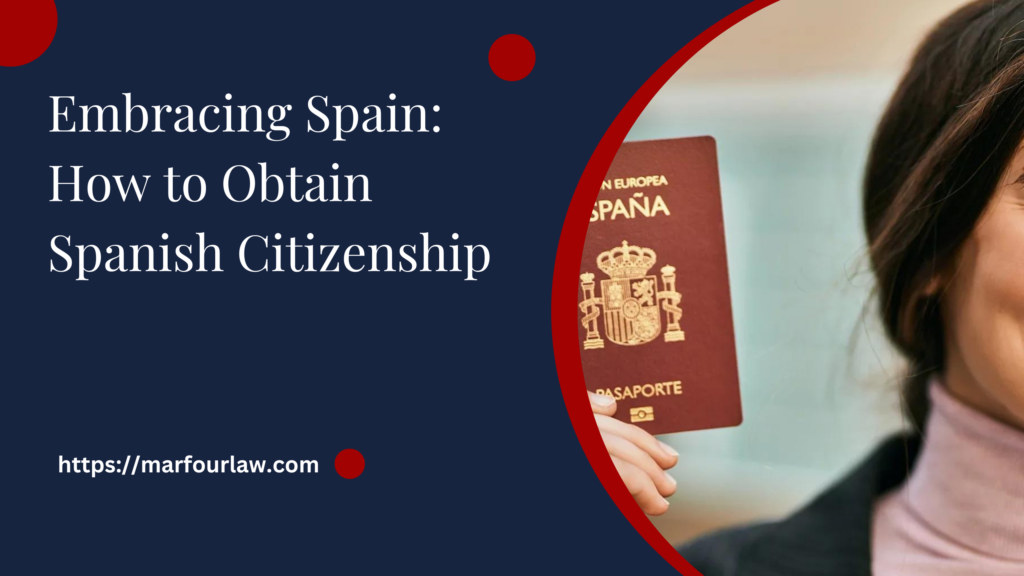Spanish Citizenship
Are you looking to settle down permanently in Spain? If so, you have to acquire Spanish citizenship. There are different ways to obtain Spanish citizenship including by residence, by marriage, by descent, by option, and recently by Sephardic origin.

Getting into Spain – How to Obtain Spanish Citizenship?
Our English-speaking Immigration lawyers will make your path easy to obtain the Spanish citizenship.
They will lead you in understanding the eligibility criteria, associated expenses, and the steps required for application.
In this article, we’ll explore the steps you need to take to become a Spanish citizen and make this journey easier to understand. Let’s move ahead!
What is Spanish Citizenship? Get An Idea
Once you’ve lived in Spain for five years, you can apply for permanent residency. After a decade of residency, you can then apply for Spanish nationality. However, some exceptions exist that may shorten this timeline for certain individuals. For instance, if you’re married to a Spaniard or are the child of a Spanish parent, you may apply earlier. While Spanish citizenship and permanent residency grant the right to live in Spain, there are distinctions between the two statuses.”
Choosing Between Permanent Residency and Citizenship in Spain
Opting for an EU long-term permanent residence permit allows you to remain in Spain as a resident while retaining your original nationality and passport. As a Spanish permanent resident, you’ll have access to many of the same privileges as Spanish citizens. However, you must meet specific requirements, including demonstrating financial self-sufficiency. This status permits limited travel within the EU, extendable with proper authorization.
On the other hand, becoming a Spanish citizen requires renouncing your original nationality and passport unless you qualify for an exception (details below). This grants you full rights as a Spanish citizen, including EU citizenship and the freedom to move within its borders. Additionally, you gain the right to participate in European elections.
General Requirements for Spanish Citizenship
Residency Period:
Typically, you must have legally resided in Spain for a specific period. The standard requirement is ten years of legal residence. However, there are exceptions:
- Ibero-American or Filipino
- Nationals: The residency requirement is reduced to 2 years.
- Sephardic Jews: Reduced to 2 years, based on specific historical ties.
- Refugees: The requirement is reduced to 5 years.
- Marriage to a Spanish Citizen: The requirements can be reduced to 1 year of marriage and legal residence.
Spanish Language Proficiency:
You will need to demonstrate proficiency in Spanish. This is typically done by passing the DELE (Diploma de Español como Lengua Extranjera) exam at the A2 level or higher.
Knowledge of Spanish Culture and Society:
Passing the CCSE (Conocimientos Constitucionales y Socioculturales de España) exam, which tests knowledge of Spain’s constitution, history, culture, and society.
Clean Criminal Record:
Provide a certificate of good conduct issued all countries authorities where you have resided during the required period.
Sufficient Means of Support:
Show proof of stable financial means to support your expenses and any dependents’.
Giving Up of Previous Citizenship:
Spain generally does not allow dual citizenship for non-Ibero-American countries, including the Philippines. Therefore, you may be required to renounce your Filipino citizenship unless specific exceptions or agreements exist.
4 Benefits of Spanish Citizenship
Obtaining permanent residence in Spain offers several benefits to individuals who wish to live and work in the country long-term. Here are some key advantages:
Your own Legal Status: Stable Residency:
You are legally permitted to reside in Spain indefinitely, providing stability and security for you and your family.
You will have Work and Business Authorization:
You have the right to work in Spain without needing a work permit. As a permanent resident, you can start your own businesses or work as a self-employed individual.
You can apply for family reunification.
Allowing your immediate family members to join you in Spain.
- Education: Your children have access to Spanish public education.
You will have access to Social Security and Healthcare
You are entitled to access the Spanish public healthcare system. Moreover, you can contribute to and benefit from the Spanish social security system.
You Have the Right to Freedom of Movement
As a permanent resident of an EU country, you have the right to travel freely within the Schengen Area and to travel to other Schengen countries for short stays without a visa.
3 Ways to Obtain Spanish Citizenship:
Acquiring Spanish nationality can be achieved after residing in Spain for 10 years. However, alternative routes exist, such as marriage in Spain or being born to Spanish parents, even if you or your parents were born outside of Spain.
All applicants are required to demonstrate good citizenship. This includes financial stability, a clean criminal record, and a sufficient level of integration into Spanish society. This might involve speaking Spanish and participating in social activities reflective of Spanish culture.
To apply for citizenship, you must visit the Civil Registry in your area of residence in Spain. You’ll need to bring the necessary supporting documents for your citizenship application and a completed application form for Spanish citizenship.
Applicants 18 years or older, 14 or above with legal assistance, or legal guardians of individuals under 14 can apply for Spanish citizenship. Seeking guidance from experienced immigration attorneys can greatly simplify the process, as they can assist you at every stage of obtaining your residency permit.”
Exceptions to the 10-Year Residency Rule
In certain circumstances, individuals can apply for Spanish nationality with shorter residency periods:
- Refugees: They can apply after residing in Spain for five years.
- Nationals from Spanish-American countries, Andorra, the Philippines, Equatorial Guinea, Portugal, and Sephardic origin: They only need to wait two years.
For specific cases:
- If you are born in Spain to legal foreign residents, the required period is just one year.
- The same one-year period applies if you are:
- Married to a Spaniard
- Widowed from a Spaniard
- A child or grandchild of a Spaniard
- Born outside Spain to a Spanish national (through birth or residence)
Additionally:
- Descendants of expelled Sephardic Jews from Spain have an unique opportunity. They can apply for Spanish citizenship without residing in Spain if they can demonstrate special connections to Spain and pass tests on the Spanish language and history.
- The application deadline for this special provision is 1 October 2019.
These exceptions provide shorter paths to Spanish citizenship for individuals meeting specific criteria.
Spanish Citizenship by Origin or Birth
You may be eligible for Spanish citizenship through the ‘Option’ process, where no residency period is needed if you fall under these categories:
- Born to a Spanish mother or father.
- Children born in Spain to foreign parents, provided at least one parent was also born in Spain. (Note: This does not include children of diplomats and consuls accredited in Spain.)
- Adopted by a Spaniard and are under 18 years old or over 18 and adopted within the last two years.
- Born in Spain to foreign parents whose identity is unknown or whose country of origin is undetermined (such as stateless individuals or refugees). This also applies if neither parent’s nationality could be legally passed on to you.
Other situations that qualify for Spanish citizenship, requiring one year of residency, include:
- Born outside Spain to parents (also born outside Spain) and originally Spanish grandparents.
- Having a Spanish guardian or foster parent.
- Not having properly exercised the right to acquire Spanish nationality by option.
These conditions outline the circumstances under which individuals can acquire Spanish citizenship based on their origin or birth, with or without a residency period requirement.
Spanish Citizenship through Marriage
If you are married to a Spaniard, you can expedite citizenship by becoming a Spanish citizen after residing in Spain for one year. The application process and requirements are the same as the standard citizenship procedure. The key difference is that you do not need to fulfill the usual 10-year residency requirement.
However, to become a Spanish citizen, you must renounce your existing citizenship. This is a standard requirement for those obtaining citizenship through marriage.
Additionally, you can also claim Spanish citizenship as the widower or widow of a Spaniard. It is important to note that you must not have been separated from your spouse at the time of their passing.
Costs of Applying for Spanish Citizenship
A non-refundable processing fee is required for your citizenship application in Spain. The fee varies, typically ranging between €100- €120, regardless of whether your application is approved or rejected. Additionally, there may be fees for issuing certificates and documents needed for your application.
Dual Nationality in Spain
Upon successfully obtaining Spanish citizenship, you must pledge your loyalty to the King and obey the Spanish constitution and laws.
Renounce your previous nationality unless you are from a Spanish-American country, Andorra, the Philippines, Equatorial Guinea, or Portugal. However, Sephardic Jews and their descendants have the option to maintain dual nationality, allowing them to hold both Spanish and their original citizenship.
If you reside abroad and acquire another nationality for more than three years or actively use your previous nationality during this time, you will lose your Spanish citizenship. The only exception to this rule is if you declare to the Civil Registry within that period your desire to retain Spanish nationality.
FAQs
Here are some important FAQs:
1: How long do I need to live in Spain to apply for Spanish citizenship?
Generally, you must reside in Spain for 10 continuous years to be eligible for Spanish citizenship. However, there are exceptions for certain groups such as refugees (5 years) and individuals from specific countries (2 years).
2: Can I apply for Spanish citizenship through marriage?
Yes, if you are married to a Spanish citizen, you can apply for Spanish citizenship after living in Spain for one year. This process allows for faster naturalization, but you will need to renounce your previous nationality.
3: Are there any exemptions to the 10-year residency requirement?
Yes, there are several exemptions. For example, if you are from a Spanish-American country, Andorra, the Philippines, Equatorial Guinea, or Portugal, you only need to reside in Spain for 2 years. Other exemptions include being born in Spain to foreign parents or being the child of a Spaniard.
Spanish citizenship represents a gateway to stability, opportunity, and integration into the vibrant tapestry of Spanish life. Whether through the traditional 10-year residency route, the expedited process for marriage to a Spaniard, or by birth or descent, the path to citizenship requires demonstrating a commitment to Spanish society through language proficiency, financial stability, and adherence to the country’s laws. Upon obtaining citizenship, individuals gain the right to live, work, and study in Spain indefinitely, access to healthcare and education systems, and the freedom to travel within the European Union.
This status not only fosters a sense of belonging but also opens doors to cultural enrichment, economic prospects, and the chance to participate in the diverse and dynamic Spanish community fully. Ultimately, Spanish citizenship offers a profound opportunity for individuals to build a fulfilling and vibrant life in a country renowned for its rich history, diverse culture, and warm hospitality.
Experts in Obtaining Spanish Citizenship
Spanish citizenship is regulated by the Spanish Civil Code and Royal Decree 1004/2015, of November 6, approving the regulations governing the procedure for acquiring Spanish nationality by residence.
There are several ways to acquire Spanish nationality.
The main ways to obtain Spanish citizenship are by residence, marriage, descent, option, and, recently, Sephardic origin.
Our English-speaking immigration lawyers can help you obtain your Spanish citizenship whatever in which situation you stand.
obtained Spanish Citizenship by origin
Assisted clients
%
satisfied clients
Spanish Citizenship By Origin
The main way to acquire Spanish nationality is by origin:
- Those born to a Spanish father or mother.
- Those born in Spain who are the children of non-Spanish parents if at least one of their parents was born in Spain (except for children of diplomats).
- Those born in Spain to non-Spanish parents, if both have no nationality (status of stateless persons) or if the legislation of neither grants, nationality to the child. In this case a form can be submitted at the local Civil Registry of your place of residence to declare Spanish nationality based on mere assumption.
How can we help you?
- Offer tailored legal assistance
- Help you gather the necessary documents.
- Arrange meetings with the Spanish authorities on your behalf.
- Prepare the application forms.
- Follow the application until it is resolved.
- Assist in getting a Spanish Passport and DNI.
Spanish Citizenship By Option
If so, you have the option to apply for Spanish nationality without living in Spain.
Spanish Nationality by option is the second most common method of acquiring the Spanish passport.
The following people have the right to acquire Spanish nationality by option:
1. Those who are or have been subject to the parental authority of a Spanish national.
2. Those whose father or mother was Spanish or born in Spain.
3. Those whose adoption by Spanish nationals occurred after reaching 18 years of age.
How to get Spanish citizenship by option
How long does the Spanish nationality application process take?
Applications submitted in Spain will take around 6 months, whereas applications submitted at the Spanish Consulate should take between 4 and 8 months.
The final step of the Spanish citizenship, after the approval of the application, is the JURA of the Spanish Constitution and Monarchy. Then, after a couple of months you will be able to collect your Spanish Birth Certificate and proceed with the expedition of your Spanish passport and ID.
Marfour International Law Firm will
- Offer tailored legal assistance.
- Help you gather the necessary documents.
- Arrange meetings with the Spanish Consulate on your behalf.
- Prepare the application forms.
- Follow the application until it is resolved.
- Assist in getting a Spanish Passport and DNI.
Do not hesitate to contact Marfour International Law Firm. Our Spanish immigration lawyers will be glad to assist you every step of the way.
We can handle your Spanish citizenship application on your behalf.

obtained Spanish Citizenship by residence
assisted Clients
%
satisfied clients
Spanish Citizenship By Residence
The third most common way to obtain Spanish Citizenship is after living for a long time in Spain.
This method of acquiring Spanish nationality requires continued legal residence in Spain for at least ten years immediately prior to the application.
However, there are cases in which the required period of residence can be reduced, as you can see below:
- Five years: for those who have obtained refugee status.
- Two years: for nationals of Ibero-American countries, Andorra, the Philippines, Equatorial Guinea, Portugal, or persons of Sephardic origin.
- One year:
- For those born in Spanish territory.
- For those who have not exercised their right to Spanish nationality by option.
- For those, who, at the time of the application, have been married for one year to a Spanish national and are not legally separated and have not had a common-law separation.
- For the widower or widow of a Spanish national, if, at the time of the death of the spouse, they were not separated personally or legally.
- For those born outside Spain to a Spanish father or mother (also born outside Spain), grandfather or grandmother, if all were originally Spanish.
How can I get Spanish Citizenship, and what are the main requirements?
According to Law 1004/2015, approved on November 7, 2015, the applicant for Spanish Citizenship by Residence should pass DELE A2´s Exam (Language exam) and CCSE (Cultural test). Both exams are organized by the Instituto Cervantes. There are some cases where applicants do not need to pass these exams. Check with our expert lawyers in Madrid or Barcelona for more information.
1. The application can only be submitted online to the Dirección General de los Registros y del Notariado.
2. The Ministry has up to one year to respond to your application.
However, the administration can take more time in total to resolve a Spanish citizenship application by residence.
In all cases, it is possible to expedite the application and get Spanish citizenship approval within one and a half year.
What are the required documents needed to apply for Spanish citizenship?
Each one of the four options has its own list of documents and requirements. Contact our legal advisers to find out which documents you will need for your application.
obtained Spanish Citizenship by Naturalisation
assisted Clients
%
satisfied clients
Spanish Citizenship by Naturalization Letter
Finally, the fourth option of acquiring Spanish nationality is by naturalization. This method is ex-gratia and is not subject to the general rules of administrative procedure. It shall be granted, or not, at the discretion of the Government by Royal Decree, after an evaluation of exceptional circumstances.
Our immigration lawyers in Spain can help you apply for Spanish Citizenship by Naturalization Letter.
Testimonials
![]()
![]()
![]()
MARFOUR IS READY TO ASSIST YOU WITH YOUR SPANISH CITIZENSHIP
Contact us, and Marfour International Law Firm will assist you in obtaining your Spanish Citizenship. One of our specialized English-speaking lawyers will contact you immediately to help and advise you. Do not hesitate to send us your enquiry.

